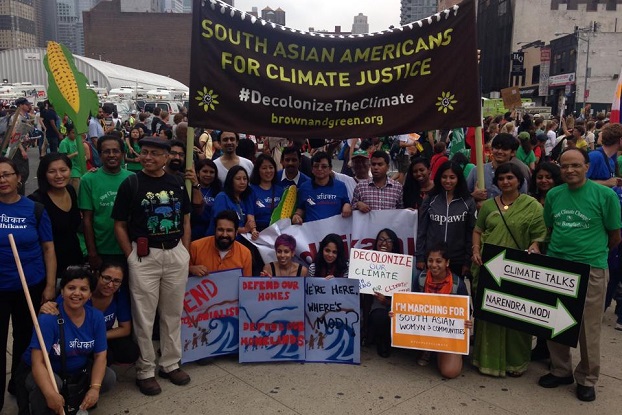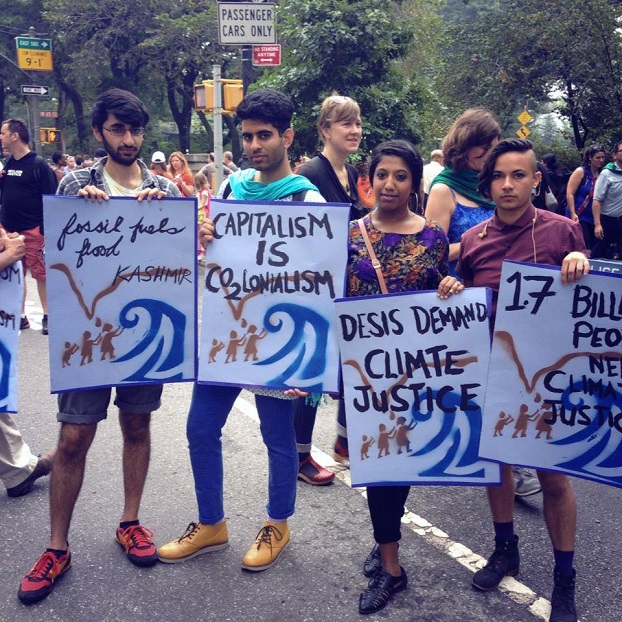 Sunday morning the world came together and took to the streets for the People’s Climate March. It was the largest event of its kind in human history, [pullquote align=”right”]Desis were there in full force.[/pullquote]with 400,000 people gathering in New York City to ring the alarm on climate change days before world leaders gather for the UN Climate Summit. Beyond New York, there were major events in cities throughout South Asia including New Delhi, Islamabad, Dhaka, Kathmandu, Colombo, and Malé. There is no question now that this is the defining movement for our time — and yes, Desis were there in full force.
Sunday morning the world came together and took to the streets for the People’s Climate March. It was the largest event of its kind in human history, [pullquote align=”right”]Desis were there in full force.[/pullquote]with 400,000 people gathering in New York City to ring the alarm on climate change days before world leaders gather for the UN Climate Summit. Beyond New York, there were major events in cities throughout South Asia including New Delhi, Islamabad, Dhaka, Kathmandu, Colombo, and Malé. There is no question now that this is the defining movement for our time — and yes, Desis were there in full force.
Barnali Ghosh from the the San Francisco Bay Area group Brown and Green: South Asians for Climate Justice said, “The South Asians for Climate Justice delegation was critical. South Asia is climate ground zero, and our actions in the United States can either reduce the risk or further endanger 1.7 billion people. For every time we take action in the US to vote for climate leaders, shut down another dirty energy facility, divest from mega-polluters, or reinvest in real solutions, we achieve a double victory — not only helping communities in the US, but simultaneously also in our homelands. That is why we are here. We must use our power and privilege now to demand climate action with real solutions.”
Through the joint South Asians for Climate Justice contingent, one hundred fifty members of eleven South Asian community groups came together to begin this process by learning from each other and then marching in a united Desi front. Anirvan Chatterjee, one of the contingent organizers said, “Our contingent looked like our community — our whole community — with over three generations of South Asian environmental activists from coming together from all over the United States, and as far away as Canada and the UK.”
One of the signs at the event read “Defend our homes, defend our homelands,” a reference to the fact that South Asia is one of the most climate-vulnerable regions of the world, with crop failures in India, floods in Pakistan, sea level rise in Bangladesh, intense rain in Sri Lanka, glacial lake outburst floods in Nepal and Bhutan, and the potential disappearance of the Maldives.
The events began with members of the Bangladeshi community sharing their hopes for the talks. According to Sayed Rahman from the Bangladesh Environmental Network, “while world leaders are dithering, climate refugees in Bangladesh are living with the consequences of catastrophic climate change created by major greenhouse gas polluters like the United States and Europe. We all call on world leaders, particularly President Obama and the U.S. Congress, to work toward ambitious international emissions reduction targets.”
The large Sikhs for Climate Justice group opened with a prayer before the march, linking their environmental justice activism with their faith. According to Bandana Kaur, environmental researcher and Program Ambassador of EcoSikh, “we march because this understanding of the universe is embedded within the Khalsa ideal for Sikhs — a word that also signifies the sovereign body of Sikhs who make a commitment to protecting the most marginalized among us, a strong call to environmental justice.”
New York-based organizing groups emphasized the links between local and global. Padma Seemangal of the Indo-Caribbean Alliance said her group was participating because “As a community we have witnessed first-hand the devastating effects of Hurricane Sandy both in our neighborhood and across New York City.” Rasel Rahman, a senior community organizer at Chhaya CDC sees deep links between the global climate justice movement and his agency’s housing rights work in New York. “From Hurricane Sandy in New York to mega-floods in Kashmir, climate change robs communities around the world of their support systems. We demand equitable reinvestment in all our communities, and call for UN Climate Summit participants to fully fund the Green Climate Fund.”
Devika Ghai of the Alliance of South Asians Taking Action was one of twenty community members participating in a parallel climate rally taking place in Oakland, California. She worried about her grandmother, whose community had been affected by the 2013 Uttarakhand floods in India. Ghai compared the climate crisis to colonialism, where much of the atmosphere’s ability to absorb carbon has been monopolized by a small group of industrialized nations, while residents of the most vulnerable communities around the world pay the price.
[pullquote]Do not pretend like our generation believes just a march will solve the climate crisis. We inherited this Earth and we will save it. What we do next is everything.” -Sharmin Hossain, Ya-Ya Network [/pullquote]
Alok Vaid-Menon of the South Asian spoken word group DARKMATTER, echoed this idea saying, “Climate change’ is not a failure of Western capitalism, but actually the total success and realization of it. The same poverty-generating systems that built the West are the ones wreaking havoc on the water, air, and land. The ‘solution’ then, is not to get down to 350 parts per million, or to institute a carbon tax, or create more solar panel startups, or fund another wind farm, or screw in better light bulbs. The goal is to continue to fight state violence, colonialism, and capitalism at their roots.”

Sharmin Hossain of the Ya-Ya! network built on the day’s urgency, “We know that these marches are not movements, but do not ignore the presence of all the resisters. Do not invisiblize the communities who are taking the streets, dancing in the streets, marching with art and visions. Do not pretend like our generation believes just a march will solve the climate crisis. We inherited this Earth and we will save it. What we do next is everything.”
The work before the UN Climate Summit hasn’t ended. South Asians for Climate Justice contingent members carried signs saying things like “Flood Wall Street, not Kashmir,” a reference to the Flood Wall Street direct action event that took place today before the UN Climate Summit. Several contingent members will also be participating in the People’s Power Climate Justice Summit which runs parallel to the UN summit. You can show your support by signing this 18 Million Rising petition demanding that President Obama lead on climate action and just solutions.
To stay connected, follow the work of any of the 11 organizations that came together to participate in the South Asians for Climate Justice contingent at the People’s Climate March:
- Brown & Green: South Asians for Climate Justice (www.brownandgreen.org)
- EcoSikh (www.ecosikh.org)
- Bangladesh Environment Network (www.ben-global.org)
- Chhaya CDC (www.chhayacdc.org)
- Adhikaar (www.adhikaar.org)
- Indo-Caribbean Alliance (www.indocaribbean.org)
- DRUM South Asian Organizing Center (www.drumnyc.org)
- Alliance for a Secular and Democratic South Asia (www.southasiaalliance.org)
- Alliance of South Asians Taking Action (www.asata.org) [at parallel Bay Area event]
- Association for India’s Development, NYC (www.aidnyc.org)
- Indian Youth Climate Network (www.iycn.in)
If you don’t have a local group in your area, you can stay connected via Brown & Green’s Tumblr blog, Twitter, or Facebook. To learn more about the delegation, or how to get involved with future joint projects, email connect@brownandgreen.org.
























